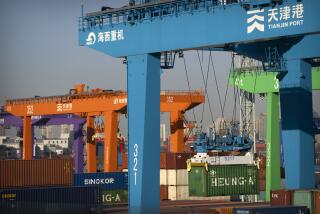OECD Issues Its Predictions for New Year : Economy: The 24-nation think tank sees continued growth for the industrialized world.
- Share via
PARIS — Economic growth in the industrialized world will continue for an eighth straight year in 1990 at the start of a decade that promises far-reaching if unpredictable changes, the OECD said Thursday.
The 24-nation think tank said in its latest semiannual outlook that economic reform in Eastern Europe should benefit both East Bloc countries and their trading partners in the West.
“The challenge here is daunting, but the potential benefits are far-reaching both for the countries concerned and for the world economy,” the Organization for Economic Cooperation and Development said.
David Henderson, head of the organization’s economic statistics unit, said at a news conference that OECD trade is unlikely to be affected in the next two years by changes in Eastern Europe.
“But that may change. . . . It’s very likely that trade flows will increase,” he said, noting that West German exporters will probably be the first to benefit from East Bloc reforms.
In a broadly optimistic report, the Paris-based study group stood by its forecasts made in June that there will be no recession next year.
It predicted that the average gross national product growth in its area will be near 3% in both 1990 and 1991.
That would be below this year’s 3.6% growth but at a level where inflation could be contained, it said.
The OECD expects average price rises of 4.5% in the next two years, little changed from this year’s 4.3%.
That would still be too much and would require that interest rates be kept high, especially with wage demands becoming a potential inflationary threat, it warned.
Slower growth, new technology and more productive work forces are expected to leave unemployment at this year’s rate of 6.6% in both 1990 and 1991.
But given the OECD’s tendency to underestimate growth, the agency acknowledged that economic activity could be faster than it projects.
More to Read
Sign up for Essential California
The most important California stories and recommendations in your inbox every morning.
You may occasionally receive promotional content from the Los Angeles Times.











